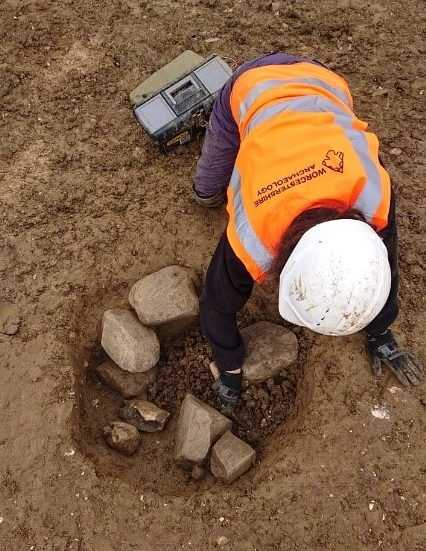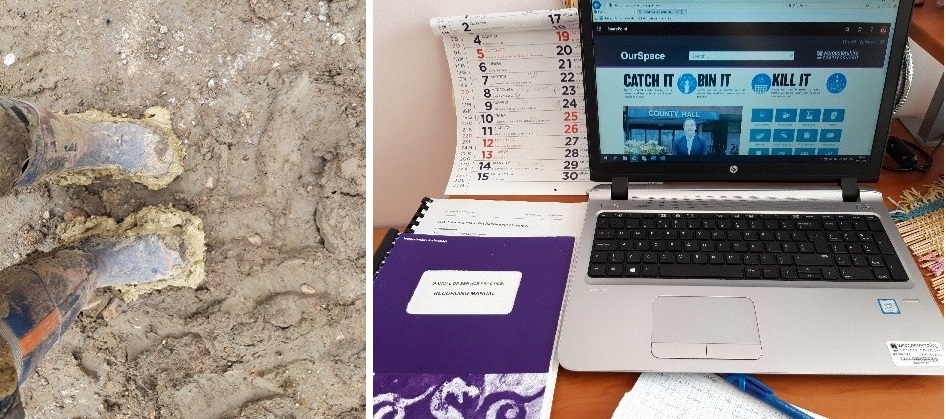From muddy boots to laptops – Worcestershire Archaeology’s new trainees
- 12th May 2020
Now in it’s fifth year, our trainee scheme is well established. Martina, Chris and Roland joined our archaeology team in early March 2020 – ideal timing to gain experience on our busy programme of fieldwork projects. Err… or not, as it turned out. Yep, you’ve guessed it: a global pandemic and national lockdown was just around the corner.
What work can archaeological trainees do from home? Chris, Roland and Martina tell us about their experiences so far, starting with an explanation of how the traineeships work (in normal times):
Of all the commercial archaeology units across the country very few offer a formal traineeship to graduates with no commercial experience. As a result, many starting in commercial archaeology get thrown in the deep end with their first commercial job. This is where formal traineeships, like Worcestershire Archaeology’s (WA), come into their own, as over the course of 9 months you’re actively taught archaeological methods and practices whilst on the job.
The traineeship is not limited to excavation – we also take part in post-excavation tasks, outreach and working with the archives. This wide and comprehensive training is very reassuring, as it shows the commitment WA have to us, which goes against the norm of short term contracts and little job security.
Personally, I was very fortunate during university to spend most of my summer holidays away on various research projects. However, I knew there was a lot I still didn’t know about fieldwork, especially as commercial projects are very different to research ones. I saw this traineeship as an opportunity to get an excellent, well-rounded start to my career as an archaeologist, learning all aspects of the profession; not just fieldwork. Chris

Martina excavating the posthole of an Iron Age roundhouse, which turned out to contain bones, flint and pottery – March 2020
It has been a great experience so far. I graduated with a degree in Archaeology in 2019, and the traineeship is the perfect next step to beginning a career in archaeology. As part of the training we are working towards completing an NVQ (level 3) in Archaeological Practice, which will bring us up to ‘practitioner’ level, as recognised by the Chartered Institute for Archaeologists (CIfA). Before the lockdown began, I was working on an evaluation and I felt like every day I was learning and improving my fieldwork skills. It is good to be part of a friendly and highly-skilled team. Roland
My wish to learn as much as possible has been fostered from the very beginning. On the second day of work I was out in the field, and after a month I had gained considerable experience by excavating two interesting and different sites; a Roman rural field system and an Iron Age settlement (see below). Working with competent archaeologists is truly inspiring for a trainee, and being constantly trained and monitored is key to progress. This traineeship is proving to be a great opportunity to become a professional archaeologist and develop a career in the field. Martina
So, what have our trainees been up to since lockdown?
Less muddy grounds and more… homeworking! You may think there is not much a trainee can do out of the field, but this is not the case in our team. As the post is not only fieldwork-based but includes completing an NVQ, I’m currently working towards several units for this qualification. M
Thanks to technology, we’ve had a virtual meeting with our NVQ coordinator to talk through the processes and how we can utilise this time out of the field to get a head start on the NVQ. C
For example, I have been completing the health and safety unit, and beginning to work on the research and analysis skills module. As well as NVQ work, I have been using this time to do continuing professional development (CPD) and reading a lot about the archaeology of Worcestershire and the West Midlands, to get more familiar with the region we are working in. R

Lockdown transition – exchanging muddy boots for laptops at home
As a trainee with WA, I have CIfA membership that gives me free access to many e-learning modules and useful resources for professional development. Having a work laptop and WCC remote network access also enables me to make use of the archives and project data for research. M
The ability to Skype and Zoom call is a lifeline for allowing us all to work together whilst also being in our separate homes. The hardest bit myself has been finding somewhere to actually work, as three other family members are in my household. Having been put at the bottom of the pecking order in terms of priority for work space, I have had to jump between free rooms in the house or sit out in the garden and battle with losing internet connection in order to try and work. C
Going from on-site teamwork to homeworking can be a bit disorientating and challenging, though much less so if you feel the presence and support of your colleagues and managers. Regular emails and calls, as well as WhatsApp updates and more informal tea break chats on Zoom are helping to retain a sense of normality, being productive and keeping focused. M
Post a Comment